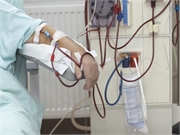- Are You Making This Expensive Thermostat Error This Winter?
- Recognizing the Signs of Hypothyroidism
- 10 Strategies to Overcome Insomnia
- Could Artificial Sweeteners Be Aging the Brain Faster?
- Techniques for Soothing Your Nervous System
- Does the Water in Your House Smell Funny? Here’s Why
- Can a Daily Dose of Apple Cider Vinegar Actually Aid Weight Loss?
- 6 Health Beverages That Can Actually Spike Your Blood Sugar
- Treatment Options for Social Anxiety Disorder
- Understanding the Connection Between Anxiety and Depression
COVID-19 Takes Heavy Toll on Kidneys

COVID-19 can damage the kidneys and increase patients’ risk of needing kidney dialysis, researchers report.
The study authors also warned that doctors should prepare for a significant rise in chronic kidney disease cases due to the pandemic.
For the study, the investigators analyzed data from nearly 4,000 COVID-19 patients, aged 18 and older, hospitalized at the Mount Sinai Health System in New York City between Feb. 27 and May 30, 2020.
Acute kidney injury (AKI) occurred in 46% of the patients, and one-fifth of those required dialysis, according to the study published Sept. 3 in the Journal of the American Society of Nephrology.
The in-hospital death rate was 50% among those with AKI, compared with 8% among those who didn’t have AKI. Only 30% of those who developed AKI survived and had kidney recovery, the findings showed.
“We are grappling with a great deal of uncertainty as to how the virus will impact the kidneys in the long haul,” said principal investigator Dr. Girish Nadkarni. He is co-director of the COVID Informatics Center and an assistant professor of medicine (nephrology) at the Icahn School of Medicine at Mount Sinai, in New York City.
“We may be facing an epidemic of post-COVID-19 kidney disease, and that, in turn, could mean much greater numbers of patients who require kidney dialysis and even transplants,” Nadkarni said in a Mount Sinai news release.
Senior study author Benjamin Glicksberg is an assistant professor of genetics and genomic sciences at the Icahn School of Medicine and Institute for Digital Health.
Glicksberg said, “In light of the data we have collected about AKI and other kidney abnormalities associated with COVID-19, our first priority must be to identify patients early and disrupt the progression of kidney disease. We are currently using machine learning to build models that can predict outcomes such as these, which will be assessed within Mount Sinai and disseminated to other hospitals across the country.”
Nadkarni added that “the sheer number of AKI cases, and the overwhelming need for dialysis that we are seeing in the context of COVID-19, is unprecedented. These findings may help health systems prepare for the high rates of renal dysfunction in incoming COVID-19 patients.”
More information
The U.S. Centers for Disease Control and Prevention has more on COVID-19.
Source: HealthDay
Copyright © 2026 HealthDay. All rights reserved.










